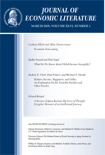
JOURNAL OF ECONOMIC LITERATURE
Scope & Guideline
Exploring the depths of economic thought and theory.
Introduction
Aims and Scopes
- Economic Theory and Methodology:
The journal publishes works that explore foundational and advanced economic theories, including both classical and contemporary methodologies. This includes discussions on nonparametric approaches, game theory, and behavioral economics. - Public Policy Analysis:
A significant focus of the journal is on the intersection of economics and public policy. Papers often analyze the implications of economic theory on policies regarding healthcare, education, taxation, and welfare. - Inequality and Social Justice:
The journal addresses issues of economic inequality, including racial and gender disparities, and explores the economic implications of these inequalities. This includes discussions on wealth distribution, mobility, and the impact of policies on marginalized communities. - Global Economic Trends and Historical Perspectives:
The journal provides insights into global economic trends, historical economic events, and their lasting impacts. This includes analyses of globalization, economic crises, and historical economic policies that shaped current practices. - Interdisciplinary Approaches to Economics:
The journal encourages interdisciplinary research, integrating insights from political science, sociology, and history into economic analysis. This broadens the scope of economic literature to encompass various societal dimensions.
Trending and Emerging
- Impact of Technology on Economics:
Recent publications have increasingly focused on the implications of technological advancements, such as artificial intelligence and digital currencies, on economic theory and practice. This theme is critical as technology reshapes industries and labor markets. - Economic Inequality and Social Mobility:
There is a rising trend in examining the multifaceted dimensions of economic inequality, particularly concerning social mobility and the barriers faced by different demographic groups. This theme is vital for understanding systemic issues within economies. - Health Economics and Policy:
The journal is seeing a growing interest in health economics, particularly in the context of public health crises like the COVID-19 pandemic. Research on healthcare systems, access, and the economic implications of health policies is increasingly prominent. - Environmental Economics and Sustainability:
Emerging themes related to climate change and sustainability are gaining traction. Papers addressing the economic impacts of environmental policies and the transition to greener economies are becoming more common. - Behavioral Economics and Decision-Making:
There is a notable increase in research that incorporates behavioral insights into economic decision-making. This trend reflects a broader recognition of the psychological factors that influence economic behavior and policy effectiveness.
Declining or Waning
- Traditional Macroeconomic Models:
There has been a noticeable decrease in papers focusing solely on traditional macroeconomic models without integrating new methodologies or interdisciplinary approaches. This shift reflects a growing preference for innovative frameworks that incorporate behavioral insights and complex systems. - Narrowly Focused Historical Analyses:
Papers that concentrate exclusively on narrow historical analyses of economic events are becoming less frequent. The trend is shifting towards broader discussions that connect historical events with contemporary economic issues. - Conventional Approaches to Labor Economics:
The journal has seen fewer contributions focused on conventional labor economics, particularly studies that do not address the complexities of race, gender, and globalization. There is a tendency to explore these topics through more nuanced lenses that incorporate social justice perspectives. - Microeconomic Theories in Isolation:
Research that emphasizes microeconomic theories without considering macroeconomic implications or contextual factors is declining. The journal increasingly favors studies that link microeconomic behavior to larger economic systems and societal impacts. - Static Economic Models:
Papers that utilize static economic models without considering dynamic changes and the role of technology in shaping economic outcomes are less common. There is a growing emphasis on adaptive models that reflect real-world complexities.
Similar Journals
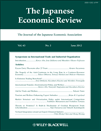
JAPANESE ECONOMIC REVIEW
Decoding economic complexities in Japan and beyond.Japanese Economic Review, published by Springer Heidelberg, is a renowned academic journal that aims to advance the understanding of economic processes within the context of Japan and the Asia-Pacific region. With an ISSN of 1352-4739 and E-ISSN of 1468-5876, this journal features high-quality research articles that span a broad range of topics in economics and econometrics. Ranked in the Q2 category for Economics and Econometrics as of 2023, it holds a Scopus rank of #332 out of 716, placing it in the 53rd percentile among its peers. Although not Open Access, the journal invites contributions that provide insights and empirical analyses beneficial to both academics and practitioners. Emphasizing a deep understanding of economic dynamics, the Japanese Economic Review is essential reading for anyone interested in the implications of economic policies and trends, making it a significant platform for scholarly dialogue and research dissemination.

Journal of Economic Inequality
Illuminating the complexities of economic inequality.The Journal of Economic Inequality is a leading interdisciplinary platform dedicated to advancing the understanding of economic disparities and their implications for society. Published by SpringerNature, this journal has achieved an impressive standing within the academic community, featured in the prestigious Q1 quartile across multiple categories, including Economics, Econometrics and Finance, Organizational Behavior and Human Resource Management, and Sociology and Political Science as of 2023. With an emphasis on high-quality empirical research and theoretical contributions, the journal serves as an essential resource for scholars and practitioners alike seeking in-depth insights into the mechanics of inequality. With a broad scope encompassing discussions across various fields, it provides vital perspectives that influence policy-making and social justice. Researchers will find valuable access to cutting-edge studies and the latest trends in economic research, reinforcing the journal's commitment to promoting knowledge that can lead to significant societal change. The journal operates from the Netherlands, with its editorial office located at CAMPUS, 4 CRINAN ST, LONDON N1 9XW, ENGLAND.

Hacienda Publica Espanola-Review of Public Economics
Catalyzing Research in Economic FrameworksHacienda Publica Espanola - Review of Public Economics is a distinguished journal published by Instituto de Estudios Fiscales, focused on the domain of public economics. With an ISSN of 0210-1173 and an E-ISSN of 2386-4176, the journal serves as a pivotal platform for scholars and practitioners in the fields of economics and finance. Though categorized in Q4 for both Economics and Econometrics, as well as Finance, the journal covers a wide range of topics, aiming to stimulate research and discourse related to fiscal policies, public sector economics, and financial regulation. Located in Madrid, Spain, Hacienda Publica Espanola is committed to providing valuable insights into the dynamics of public economic frameworks from both theoretical and empirical perspectives. The journal's objectives include publishing original research articles, comprehensive reviews, and policy analyses that contribute to the understanding and improvement of public economics. As it anticipates its converged years from 2007 to 2024, this journal invites contributions that address pressing economic issues and theoretical advancements, making it an essential resource for researchers, professionals, and students engaged in the public economics landscape.

CESifo Economic Studies
Uncovering the Dynamics of Economics and DevelopmentCESifo Economic Studies, published by Oxford University Press, is a distinguished academic journal that focuses on the interdisciplinary exploration of economics and its implications on society. With an ISSN of 1610-241X and an E-ISSN of 1612-7501, the journal aims to disseminate high-quality research that contributes to the advancement of economic knowledge, particularly emphasizing empirical findings and innovative theoretical frameworks. As a recognized leader in its field, CESifo Economic Studies holds a 2023 Q2 ranking in both Economics and Econometrics and Geography, Planning and Development, reflecting its significant impact and relevance in these areas. The journal is accessible through traditional subscription models, ensuring that critical economic research remains available to scholars, policymakers, and educators alike. With a commitment to excellence in publication, the journal supports the academic community through the provision of rigorous peer-reviewed articles that address current challenges and trends in economics. Researchers and students seeking to deepen their understanding of economic mechanisms will find this journal an invaluable resource.
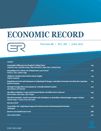
ECONOMIC RECORD
Exploring the Depths of Economic TheoryECONOMIC RECORD is a distinguished academic journal published by Wiley that has been a vital resource in the field of economics since its inception in 1925. With a focus on disseminating high-quality research, the journal covers a broad range of topics within economics and econometrics, making it an essential platform for scholars, professionals, and students alike. Although it currently does not offer open access, the journal is indexed in leading databases and maintains a respectable Q3 category ranking in the Economics and Econometrics field for 2023. The publication operates on a biennial timeline, continuing to contribute significantly to the literature from 1934 to 2024. Researchers will find its rigorous peer-review process ensures that only impactful studies are included, providing a reliable source for current trends and advancements in economic theory and practice. Located in the United Kingdom, ECONOMIC RECORD is dedicated to fostering an environment of academic excellence and innovation in the economics discipline.

Forum for Social Economics
Catalyzing Discussions on Economic and Social PhenomenaForum for Social Economics is a premier academic journal published by Routledge Journals, Taylor & Francis Ltd, dedicated to advancing the discourse in social economics, a field that bridges the gap between economic theory and social realities. With an ISSN of 0736-0932 and an E-ISSN of 1874-6381, this journal serves as a vital resource for researchers, professionals, and students interested in the multifaceted intersections of economic and social phenomena. Recognized for its academic rigor, it holds a Q3 ranking in Economics and Econometrics and Q2 in Sociology and Political Science as of 2023, further emphasizing its influential position within these disciplines. Although not open access, the journal offers a wealth of insightful articles and empirical studies, fostering a deeper understanding of social issues through an economic lens. Since its inception in 1971 and with convergence years extending to 2024, the Forum for Social Economics continues to attract contributions that provoke critical thought and innovation in economic research. Based in the United States, the journal is pivotal for those looking to explore and contribute to the evolving landscape of social economics.
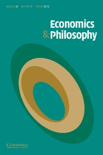
ECONOMICS AND PHILOSOPHY
Fostering Insight at the Nexus of Economics and Philosophy.ECONOMICS AND PHILOSOPHY is a distinguished journal published by Cambridge University Press, dedicated to the interdisciplinary study that bridges the gap between economic theories and philosophical discourse. With an ISSN of 0266-2671 and an E-ISSN of 1474-0028, this journal has been a critical resource for scholars since its inception in 1985, evolving continually to encompass contemporary issues and methodologies through to 2024. The journal holds a Q3 ranking in Economics and Econometrics and an impressive Q1 ranking in Philosophy for 2023, as per its category quartiles. Additionally, it ranks 123 out of 806 in the Arts and Humanities – Philosophy category, reflecting its high impact within the philosophical community. While it does not currently offer open access, the journal remains an essential platform for researchers, professionals, and students who seek to delve into the philosophical implications of economic thought and practice. In an era where economic decisions profoundly influence global society, ECONOMICS AND PHILOSOPHY plays a vital role in fostering critical dialogue and advancing scholarly insight.
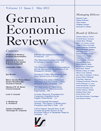
German Economic Review
Illuminating the Landscape of Economics and EconometricsGerman Economic Review is a distinguished academic journal published by WALTER DE GRUYTER GMBH, focusing on diverse aspects of economics and econometrics. With its ISSN 1465-6485 and E-ISSN 1468-0475, the journal serves as a vital platform for disseminating high-quality research from both established scholars and emerging voices in the economic field. Housed in the UK, the journal contributes significantly to the academic community, evidenced by its placement in the Q3 category for Economics and Econometrics in 2023 and its Scopus ranking of #381 out of 716, reflecting its impactful presence in the discipline. German Economic Review does not offer open access options; however, its convergence from 2001 to 2024 indicates a long-standing commitment to advancing economic discourse. This journal is ideal for researchers, professionals, and students eager to engage with contemporary economic theories and applications.
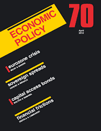
ECONOMIC POLICY
Shaping Tomorrow's Economic Landscape TodayECONOMIC POLICY is a leading academic journal published by Oxford University Press, focusing on a broad spectrum of topics within the field of economics and related disciplines. With its ISSN 0266-4658 and E-ISSN 1468-0327, the journal serves as a vital platform for disseminating cutting-edge research and innovative policy analysis critical to both scholars and practitioners. As a testament to its quality and significance, ECONOMIC POLICY is classified in the Q1 quartile for both Economics and Econometrics and Management, Monitoring, Policy, and Law, and boasts impressive rankings within Scopus—placing it in the top 25% of its respective fields. Operating from the esteemed Oxford campus in the United Kingdom, the journal has produced a wealth of knowledge since its inception in 1988, with plans to continue shaping economic discourse through 2024 and beyond. While the journal does not offer Open Access options, it remains a cornerstone for anyone dedicated to understanding the complexities of economic policy and its impact on global society.

American Economic Journal-Applied Economics
Exploring Innovative Methodologies in Applied EconomicsWelcome to the American Economic Journal - Applied Economics, a premier publication in the field of applied economics that strives to provide scholars and practitioners with cutting-edge research and insights. Published by the American Economic Association, this journal ranks in the top quartile (Q1) of Economics, Econometrics, and Finance categories as of 2023, reflecting its significant impact and relevance in the field. With a notable Scopus ranking of #5 out of 288 in General Economics and a distinguished percentile of 98th, this journal serves as a vital resource for advancing knowledge in economic theory and its application to real-world issues. Although not open access, it remains accessible to a broad audience, and welcomes submissions that explore innovative methodologies and empirical analyses that bridge theory and practice. Spanning from 2009 to 2024, the journal not only supports rigorous academic discourse but also plays a crucial role in shaping the discourse around effective economic policy. We invite researchers, professionals, and students in the field to engage with the high-quality work published within these pages.